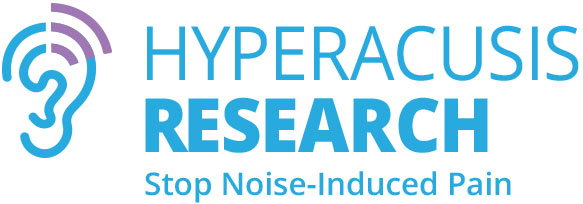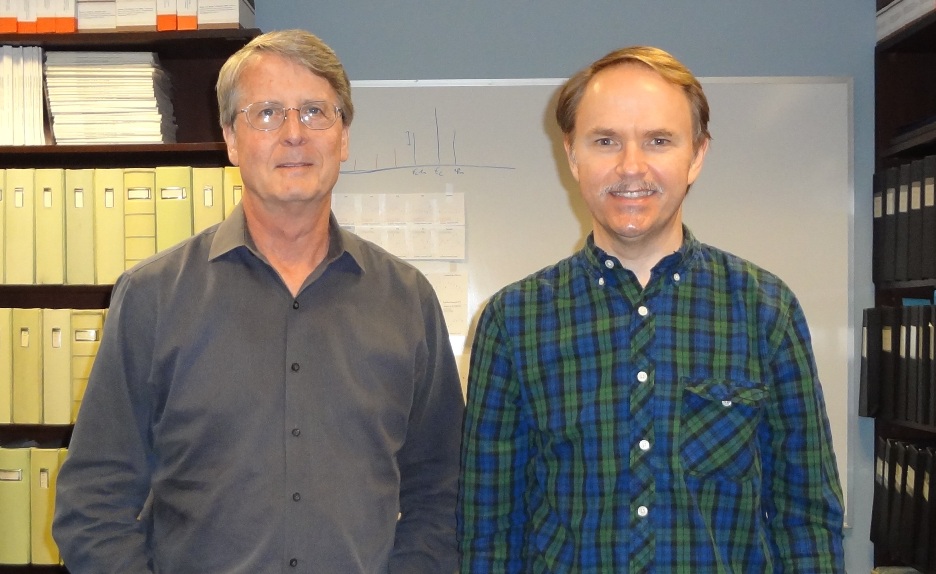Bryan Pollard, President of Hyperacusis Research, was excited to partner with Jaime García-Añoveros from Northwestern University and Charlie Liberman from Harvard Medical School to organize a symposium at the upcoming ARO 2016 Mid-winter Meeting titled: Auditory Nociception and Pain Hyperacusis.
Pictured above: Bryan Pollard meeting with Charlie Liberman to review the symposium plans.
The goal is to present the recent discovery of a pain-like system in the cochlea, which mediates auditory nociception, most likely via the cochlear type II afferents, and to relate it to the pain sensation reported by patients suffering from hyperacusis. Bryan Pollard (Hyperacusis Research) will briefly introduce hyperacusis from the patient’s perspective and Richard Tyler (University of Iowa) will follow with an in depth clinical perspective of pain hyperacusis. Jaime García-Añoveros (Northwestern University) will describe the discovery of a novel connection from cochlea to brain that mediates auditory nociception (detection of sounds harmful to hair cells) and evidence suggesting that it involves cochlear type II afferents. Charlie Liberman (Harvard Medical School and Eaton-Peabody Laboratories) will describe the features of type II afferents and their similarities with somatosensory nociceptors, and Paul Fuchs (Johns Hopkins) will demonstrate robust activation of type II afferents by hair cell damage, the most direct evidence these neurons act as auditory nociceptors. Ulf Baumgärtner (Heidelberg University) will present live imaging revealing that loud noise activates both auditory and pain-associated areas of brain. Allan Basbaum (University of California, San Francisco), a leader in the study of somatosensory pain, will describe the mechanisms underlying neuropathic pain as well as treatments currently in practice or under development.
This symposium will link basic discoveries in auditory nociception and type II afferents, as well as live brain imaging, with the poorly understood pain often associated with hyperacusis, establishing a potential parallel between somatosensory and auditory nociception as well as between neuropathic and hyperacusis pain. The target audience will include audiologists seeking to understand and perhaps better treat the clinical condition of hyperacusis and basic auditory neuroscientists interested in understanding the role of type II afferents and the neural mechanisms of ear protection.




I am a 77 year old woman, have had a stent and a heart attack. I have PTSD and suffer from panic attacks.A loud noise can totally destroy me, severe pain in brain, nausea, dizziness I start crying and can’t stop until I take a lorezepam and then it takes at least a half hour to work, sometimes if the noise was very bad I’ll need more that one lorezepam to finally stop crying and stop the chest pain and be able to breath. I live in Taos, NM but if there is someplace that I could get help I will find a way to get there. I feel that one loud noise can kill me, I feel like I’m blacking out and have to stay very quiet and still until it finally eases up. It’s a living hell
I was diagnosed with hyperacusis a few years ago and my sensitivity to noise has increased. I try not to wear ear plugs because I read they can desensitize the ears. I am now having discomfort in my ears along with pain to loud noises. I am worried that I will come in contact with a loud noise. Even minor noises are starting to bother my ears. Please find a cure or treatment for this condition. We moved to south Washington and would like a recommendation for an audiologist so that I can get retested and treated. Thank you.
Sandy, I too was told not to wear ear plugs. That was the worst advice ever. If your ears are already prone to hearing injury, not protecting them, at least with hi-fidelity ear plugs, is a mistake. I know, I learned that the hard way. I had a perfect storm of consecutive loud noise events I had to attend, and now my hearing is permanently damaged; I had tinnitus, but now I have hyperacusis and pulsatile tinnitus. Protect your hearing!
Thank you for your dedication to this. Hyperacusis is a really isolating condition…especially when your own voice causes you distress and discomfort.
Thanks for working towards better treatments. My own voice doesn’t hurt anymore but external noises still do and always will, as long as there are no effective treatments.